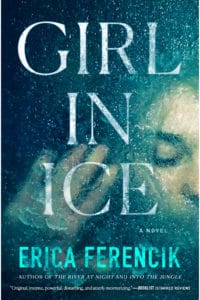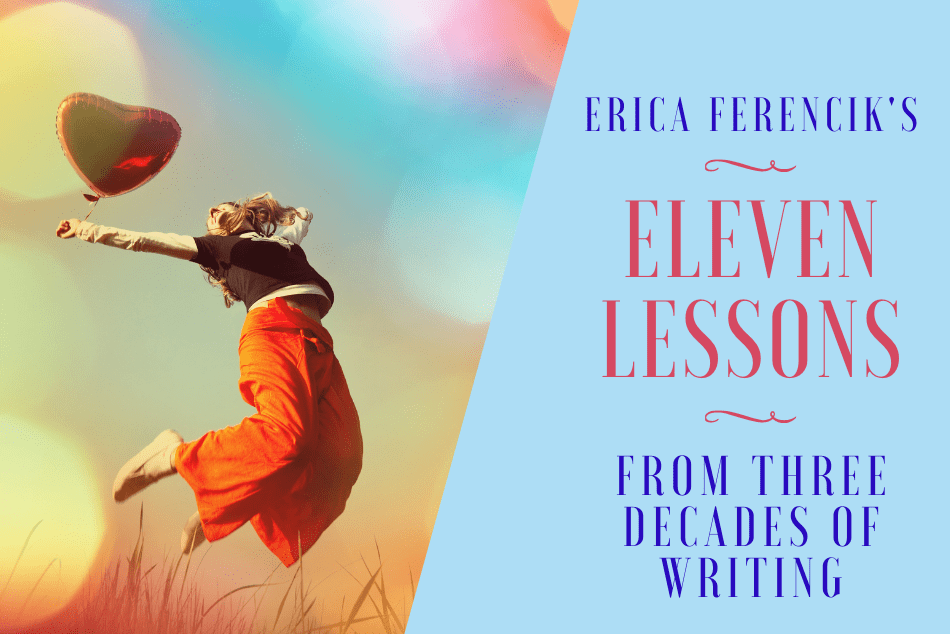1) No matter how your work is being received, love yourself at every stage of your writing life. I sure wish I had been kinder to myself.
I took rejection hard over the decades before my first novel was published. And trust me, the demons still want in. There are days I beat myself up for perceived shortcomings more than I actually write. I castigate myself for not being able to produce when it’s time to produce, for creating words, sentences – entire stories – that don’t live up to what I’d conjured so clearly and beautifully in my head. So, see? I don’t always live by my own advice. Hell, I even beat myself up for beating myself up 😊.
Each writer you were, are, or will become, is important, valid and frankly wonderful.
But here’s what I’ve learned:
Each cell in your body replaces itself every seven to ten years. It stands to reason that you will literally be a different writer in your twenties, thirties, forties, fifties and beyond. Each writer you were, are, or will become, is important, valid and frankly wonderful. Sure, we’ve all got the stories – maybe even whole novels – shoved in the drawer, but without having written them, it’s quite possible you couldn’t have moved on to what you’re working on these days, and admit it: you love what you’re working on now, right? And who knows? Maybe – in one of those squirreled-away manuscripts – an idea for a new novel or screenplay lurks, some key to the opus you were born to write. It happens all the time. It happened to me.
So don’t be such a beeyatch to yourself. Would you treat a friend like that? Of course not. Now have a cookie.
2) Who’s up? Who’s down? It changes all the time.
Nothing, and I mean nothing screams reversal of fortune louder than being in the arts. I’ve had movie deals go up in smoke, books my publisher was sure would be huge that…were not. So never, ever forget the subjectivity of this game. Cultivate skills like persistence and resilience as diligently as your writing chops. And just keep going.
3) If you love to write, shape your world in a way that allows time for you to do so. Even better: schedule it in.
You don’t have time to write. Work, family, getting some freaking exercise. I am so with you. But ask yourself: how important is getting the book done/writing the story to you? It’s everything, you say? Your heart’s desire as long as you can remember? Well, then, time to respect yourself and your heart’s desire, right?
Have a look at that beloved bookshelf of yours. Notice anything? Those authors you love whose books inspired you to write – were they all independently wealthy? Were they free to write one hundred percent of the time, with no other obligations? Probably not. But they made it happen, as you will.
4) All that said, don’t beat yourself up for those days you miss your writing time, ‘cause you’ve got to live too.
Your best writing is gleaned from every moment of being alive – beautiful ones, eerie ones, painful or strange ones. I tell my students to never feel bad about doing things that are not writing. After all, detail, emotion, characters, dialogue, plot twists all have to originate somewhere. They come from drinking too much at the party, from the agony of rejection by a lover, by incomprehensible grief, by loss, empathy, adopting that dog, that kitten, that chance encounter at the park, by holding your dying grandmother’s hand, or just how you felt this morning after that first sip of coffee. Everything that can be lived and observed is important in a writer’s life.
5) Silly me, I thought writing books would get easier over time.
Every time I write a book, it’s as if I’ve never written one. I have to figure out all over again how in the world to construct something so daunting and overwhelming. Could be there’s just too much to remember. Lessons I thought I’d absorbed years ago have to be learned all over again: pacing, point of view, surprises, reversals, the list is endless. Maybe it’s the fear of repeating myself, of treading the same paths; not being able to create new characters or surprising, riveting plots that make the task so daunting. Every time it’s like climbing Everest with barely enough oxygen, without a sherpa, in business casual.
Never feel bad about doing things that are not writing
6) Being a writer means being alone, A LOT.
So, are you okay with that? Do you enjoy it? You have to turn off the phone, ignore shoutouts from your tribe, all the blinking sparkly things, for hours and hours at a time. You have to enter a different state of being, because you won’t produce your best work unless you go there. And on top of that, you have to love it. Your life is too precious and short to do things that make you miserable.
7) The passage from your daily existence to the underwater river of your story can be a trial.
Sure, there may be days when it’s a breeze to enter the world of your story, but for me, there are demonic gatekeepers to battle first. I must pass through loneliness, through the buzzing mania of the monkey mind, through the dry and airless valley of self-doubt, past the snarling horned monster of potential failure – forget laundry, taxes and unmade beds. All this – for me – to sift a few minutes of transcendence out of several hours of ass-soreness and hair-tearing. But after the initial terrifying stages of letting go of the world as I know it, entering my story, is – for me, and will hopefully be for you – the least lonely place on earth to go
8) Writer’s block is a crock, here’s why –
A)Writing is thinking. That’s all. Words on the page are only the end result of that thinking. Before you consider yourself “blocked,” ask yourself if you haven’t done enough thinking about your story. Frustrating as hell, I know. Especially in this brutally fast spinning world. Sometimes it feels like it’s taking forever to get anywhere, even in your head. But good writing, which comes from complex thinking, takes time.
B)Maybe you’ve lost your jam. Like: This was the best idea I’d ever had, until I started working on it. Then something just fell apart. You might ask yourself, what is it about what I’m writing that has escaped the room? Where’s the energy from that nascent bombshell idea? What, in fact, was the initial excitement, thrill, burning need? Don’t despair. Going back and doing the deep dive to find the initial inspiration is something you have to do sometimes. Go find it, wrestle it back into your arms, open up that great present again, take the plunge back in.
C)Sometimes the mind and heart go a bit fallow and need a rest. There are times when there isn’t anything I want or need to say, but with all the nonstop chatter in the world, isn’t that a blessing, folks? When a tiny corner of the world shuts up for a second, to listen? To read?
9)Let’s talk about one seriously bitchy word: success.
How do you define success? If I had bought the definition of success as being a best-selling author – or in my case, even a published author – at five, ten, fifteen, even twenty-five years of writing, then I would have given up. Do marathon runners define success by winning marathons? They do not. They train daily, they keep track of small improvements, notice what ramps up their performance. And damn, they love to run, no matter what the weather.
Writing a piece of fiction is an act of love, of generosity, as a painting is the marriage of a painter’s interpretation of what she sees with her unshakable belief that the viewer will be enriched by her vision, or the dancer his dance, and so on.
Do the same with your writing career: never stop learning, never stop working; play the long game. Regarding that effing word, success, I suggest you continually update what it means to you, because for any of us it can change daily. It could mean writing a beautiful sentence or paragraph one day, the next: meeting the deadline for a contest, or: finally understanding the secrets of sizzling dialogue.
10)Criticism:
Hearing back from your beta readers – or receiving an editorial letter – can be brutal. But after a day of staunching the bleeding and hiding under the covers, you eventually have to face the criticism of those you respect. One helpful thing to keep in mind is to consider the reader: is your work the kind of thing they seek out? Who are their favorite authors? Are they yours? Are all your readers remarking on the same or different things? If the same, chances are you should give those problems a good, honest look.
Do the best you can, but don’t beat yourself bloody in the editing room. You can only do so much with your work. You will only ever have one brain, one set of eyes, one book of memories to sift through, one past that has formed you.
That said, do all you can do, and give yourself the time to do it. No band-aid fixes, no sudden moves out of pain, anger, shame, remorse, impatience!! You have to do the opposite of all of that; in fact, you must reimagine the book even more deeply than before. Remember that the world is in no hurry for your story. Stories that don’t work in some fashion are legion, but when you perfect yours and make it irresistible, that’swhen the world will fight for it and reward you.
Please don’t be completely blown off course by criticism. You may be advised to make edits that feel wrongheaded. It’s okay to listen to someone’s thoughts, then gently answer, thank you, but I won’t be making the changes you suggest.
11) Reviews – not everyone is going to love you
Well, here’s a hard lesson!
I know authors who never read their reviews because they don’t want to ride the emotional roller coaster. Some only read the good ones. For better or worse, I read all of them, though I’m far from convinced this is the best idea, because any attempt to consistently please even your “target audience” is a fool’s game.
No matter how your work is received, you must hold onto that tiny flame inside your belly that got you in all this trouble in the first place: the kryptonite-hard belief that you have a way of seeing the world that adds value to a reader’s life. Writing a piece of fiction is an act of love, of generosity, as a painting is the marriage of a painter’s interpretation of what she sees with her unshakable belief that the viewer will be enriched by her vision, or the dancer his dance, and so on.
So: keep writing and learning, but don’t forget to be kind to yourself, and to revel in your one and only beautiful life on earth.
Let’s keep the dialogue going on Facebook!
 Award-winning novelist Erica Ferencik has received glowing critical praise for her literary thrillers featuring women who face extreme physical challenges in nature, even as they grapple with internal struggles.
Award-winning novelist Erica Ferencik has received glowing critical praise for her literary thrillers featuring women who face extreme physical challenges in nature, even as they grapple with internal struggles.
Devoted to authenticity in her craft, Erica spent weeks in the wilderness of northern Maine as research for her debut novel, The River at Night, an Indie Next Pick that New York Times bestselling author Ruth Ware called “raw, relentless, and heart-poundingly real.” For her “hair-raisingly vivid” (Kirkus) follow-up, Into the Jungle, Ferencik journeyed a hundred miles up the Amazon to experience firsthand the lush  and perilous Peruvian jungle.
and perilous Peruvian jungle.
Now, inspired and informed by a month-long trip to Greenland, Ferencik sets the New York Times lauded “hauntingly beautiful” GIRL IN ICE in one of the most unforgiving, unforgettable landscapes imaginable.





